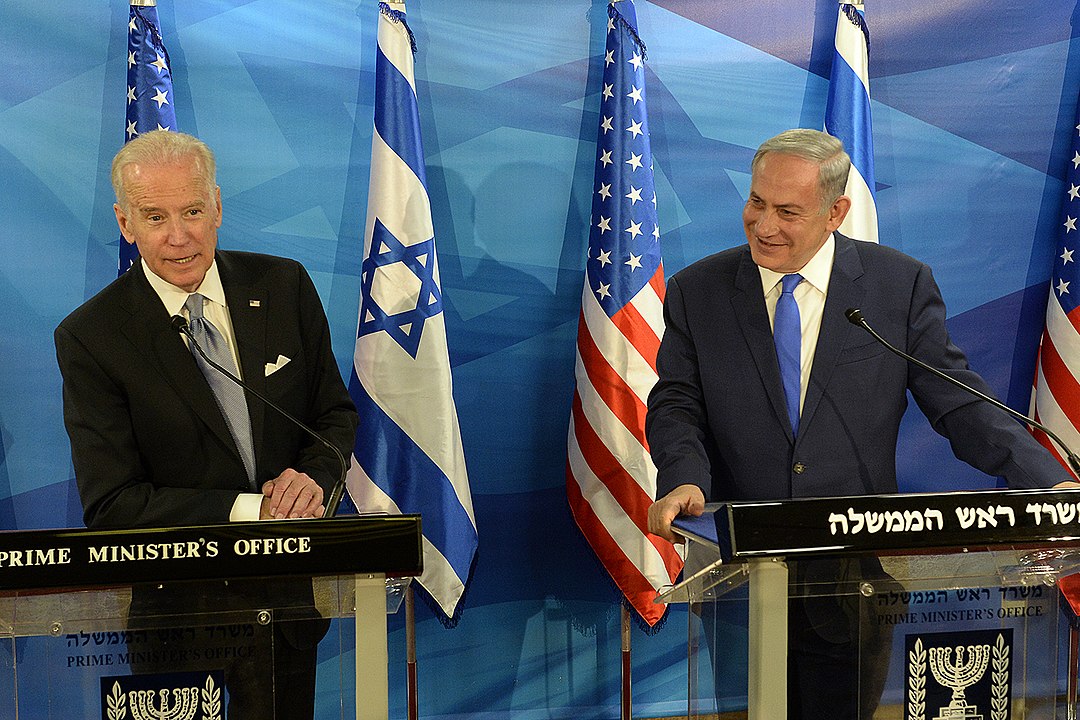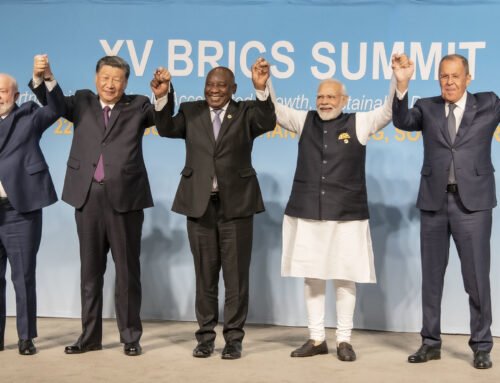PULASKI POLICY PAPER: T. Otłowski – The new U.S. administration’s policy toward the “wider” Middle East and the threat from Islamic terrorism – an attempt to forecast
Autor foto: Domena publiczna

The new U.S. administration’s policy toward the “wider” Middle East and the threat from Islamic terrorism
November 16, 2020
Author: Tomasz Otłowski




PULASKI POLICY PAPER: T. Otłowski – The new U.S. administration’s policy toward the “wider” Middle East and the threat from Islamic terrorism – an attempt to forecast
Autor foto: Domena publiczna
The new U.S. administration’s policy toward the “wider” Middle East and the threat from Islamic terrorism
Author: Tomasz Otłowski
Published: November 16, 2020
Pulaski Policy Paper No 10, November 16, 2020
Although the legal and political battle over the final outcome of the US presidential elections is not yet over, it is almost certain that it is the Democratic candidate – Joe Biden – who has secured the largest number of electors, and therefore he will become the 46th President of the United States.
After four years of Donald Trump’s “eccentric” presidency, full of sudden and unexpected decisions – also in the field of US foreign policy – the future of US strategy on key international issues again appears ambiguous. This uncertainty concerns nearly every aspect of U.S. actions on the international arena, including such key dimensions as the approach to Middle East and North Africa (MENA) area or the future of the so-called war against Islamic extremism and terrorism.
What we can already assume with a high degree of certainty is that the foreign policy of the administration of President Joe Biden (towards the MENA region in particular), should be more subdued and predictable in its form, i.e. devoid of spectacular, sudden and “spontaneous” turns. The transition of power to Democrats, however, will probably not mean an automatic reset of the past four years and a complete return to the status quo. International relations in the Middle East, both in the political (strategic) dimension and in the economic, military as well as socio-cultural sense, have undergone significant changes during this period. The current position of the U.S. in this part of the world is also different than it was before the term of President Trump, however it is not solely the result of actions (or their omissions) on the part of the previous Washington administration.
Unlike Trump, who is easily swayed by emotions, Joe Biden – as an experienced professional politician, being a typical “product” of the American political system with its traditional (formal and customary) principles of operation – has not only the ability to select competent advisors and associates, but also the ability to listen to their opinions and guidance, and to act without emotion. Analysing the past political achievements of President-elect Biden – a long-time senator (including the head of the U.S. Senate Foreign Relations Committee) and Vice President of the United States (2009-2017) – as well as his statements from the last election campaign and the Democrats’ general political agenda, we can attempt to project the main directions of Washington’s actions in the Middle East arena (in its broad sense).
It is almost certain that Joe Biden’s team will attempt to reach the essential foundations of the political strategy and doctrine of the Democratic camp when devising their political plans towards MENA and Islamic extremism. Joe Biden has already had an opportunity to learn and apply these solutions in political practice as Vice President of the United States. The essence of the Democrats’ strategy is to view the whole sphere of international relations in an idealistic spirit, which in turn results in an emphasis on creating strategies and conducting policies based on diplomacy (especially multilateral diplomacy), cooperation with allies, avoiding radical unilateral actions, and strongly promoting and supporting democratic values, human rights and civil liberties, even at the expense of objective US political and economic interests.
The key issues in the MENA region, which are likely to be the first on the agenda of the new US administration, will include: the Iranian issue, relations with Israel (including the “Palestinian issue”), relations with the Arab allies, relations with Turkey (and the pressing problem of that country’s current policy towards the region) and the ongoing conflicts in the MENA area (Syria, Libya, Yemen). The further direction of Washington’s actions towards the threats posed by Islamic terrorism will also constitute an important debate point.
The rehabilitation of the “reset” policy with Iran and the return of the US to the JCPOA regime?
As a presidential candidate, Joe Biden has repeatedly emphasised his opposition to the strategy pursued against the Islamic Republic of Iran (IRI) by the Donald Trump administration. In particular, he has been highly critical of Washington’s 2018 decision to withdraw the United States from the JCPOA (Joint Comprehensive Plan of Action) regime. This agreement – negotiated with Iran in 2015 by the US and five other powers – was one of the flagship achievements of Barack Obama’s presidency, and was aimed at preventing Iran’s nuclearisation. Joe Biden will likely advocate for the return of the United States to the multilateral dialogue with Iran, in the JCPOA format. However, America’s return to action under this agreement is likely to be conditional, i.e. dependent on Iran’s own activities and attitude. Meanwhile, since 2018 Teheran has managed to significantly depart from the basic assumptions of the JCPOA by undertaking uranium enrichment prohibited by the agreement. The situation in this regard is also complicated by the fact that Iran is scheduled to hold presidential elections in June 2021. The resulting increase in political tensions in Iran, together with the difficult domestic situation caused by U.S. sanctions and the COVID-19 pandemic, make it difficult for President Hassan Rowhani’s pro-reform team to take any conciliatory action towards the U.S.
In general, the new U.S. administration’s strategy toward Iran can be expected to be much less confrontational than it was under President Trump. The “reset” strategy towards Tehran, which could be applied by the Democrats, may concern not only the issue of Iran’s nuclear program, but also the country’s policy and interests in the region. This prospect, in turn, raises serious concerns in both Israel and most Arab states in the area, and could impinge on their relations with the United States after the change of host in the White House.
Relations with Israel – a return to the days of “David’s solitude”?
Israelis have not had a good experience with Democrats being in power in the US over the past few decades. Barack Obama’s two terms in office from 2009-2017 were a time of unprecedented cooling and hardening of U.S.-Israeli relations, with a downgrading of bilateral political, military, and economic contacts and a progressive alienation of the Jewish state from the region and the West. In contrast, Donald Trump’s presidency has been a long-unseen blossoming of U.S.-Israeli ties and an unprecedented strengthening of its position in the region. This has happened thanks to the excellent personal relations between Donald Trump and Israeli Prime Minister Benjamin Netanyahu. Political decisions of the White House have also played an important role: moving the US Embassy to Jerusalem, cooling relations with the Palestinian Authority and depriving it of American subsidies, and above all, radically toughening the course towards Iran.
It is now basically a foregone conclusion that the new president will change his course towards Israel to one closer to the Democrats’ “standard”, i.e. much more pro-Palestinian. While relocation of the American embassy in Israel is rather unlikely, an attempt to warm up relations with the Palestinians, e.g. by opening their representation in Washington and restoring generous American subsidies, appears to be a necessary condition for Biden’s broader plans regarding the Israeli-Palestinian peace process. In this aspect, the president-elect of the United States has clear and distinct priorities: any future peace treaty between Israel and the Palestinians must be based on a two-state formula, and as such excludes – pushed by Netanyahu, but allowed by Trump – plans for Israel to annex part of the West Bank territory. During the last election campaign, this issue was one of the few Middle East questions openly addressed by Biden – he left no illusions, stating that the US should “press Israel” to accept the “two-state” concept in the peace process with Palestine. This may mean that for Israelis – after four years of boom – hard years are looming ahead in their relations with America. It is difficult to expect that the current Israeli ruling circles will be willing to accept Washington’s political demands and conditions concerning the draft of a possible agreement with the Palestinians. Some consolation for Israelis may result from the fact that (as proven in recent months) the “Palestinian problem” is no longer popular among the Arabs themselves, who are willing to sacrifice it to normalise their political and economic relations with Israel.
Relations with the Gulf countries – the end of the “honeymoon years” of the Arabs?
Both the president-elect himself and his closest aides have welcomed the agreements negotiated by the Donald Trump administration to establish full relations between Israel and Bahrain, the United Arab Emirates, and Sudan. These arrangements – reaffirming President Trump’s excellent personal relationship with Middle Eastern leaders – have reshaped the geopolitical status quo in the region. The paradigm of “eternal enmity” between Jews and Arabs, determining relations in the Middle East since at least the establishment of Israel, has finally gone down in history. The Arabs themselves, deciding to open up to the Jewish state, stopped considering the “Palestinian question” as a condition for their own development and a compass of their policy towards the problems and challenges of the region. The change at the top of power in Washington as a result of the presidential elections, however, is causing anxiety in many Arab capitals. Both Joe Biden himself and his immediate entourage make no secret of the fact that while the regulation of Arab-Israeli relations is valuable and worth continuing, it cannot be done at any price. Certainly not at the expense of America turning a blind eye to human rights violations by its Arab allies from the Persian Gulf, their blatant violations of international law, or their excessive use of unjustified force in international relations. This is especially true of Saudi Arabia, which is the undisputed leader of the Gulf subregion and the largest Arab regional power. Joe Biden has long criticised Riyadh for its role in the protracted conflict in Yemen, especially for using humanitarian issues as a strategic weapon in the fight against the pro-Iranian Huti rebels. The new U.S. president will thus likely lead to an imminent end to U.S. military and material aid to the Saudi coalition fighting in Yemen. This would be a painful blow to the Saudis, especially in terms of logistical security for their operations and intelligence reconnaissance. However, Saudi Arabia could have much bigger problems – if all of Joe Biden’s policy plans from the election campaign are implemented, the country could fall to the role of a secondary U.S. partner in the region. The reason for this would be the issues strongly emphasised by the president-elect and his entourage on the dire state of human rights and civil liberties in Arabia, as well as the still unexplained case of the 2018 murder of journalist Jamal Khashoggi who was highly critical of the Saudi ruling elite – incriminating the Saudi heir to the throne Prince Mohammad bin Saud himself, the de facto leader of the Saudi Kingdom. Additionally, Biden’s win also presents Riyadh with the very real prospect of drastically reducing further arms purchases from the US. All this, combined with the probable U.S. “reset” towards Iran, makes the geopolitical future of Saudi Arabia and its allies in the Gulf region less promising.
Relations with Turkey – the end of Turkish dreams of restoring the Ottoman Empire?
Similar negative emotions and great uncertainty about the future are probably gripping Turkish President Recep Tayyp Erdogan today, a “close friend” of outgoing US President Donald Trump. It is thanks to this personal intimacy with the American leader that Erdogan has been able to successfully navigate his country’s politics over the past four years, moving between US anger and sanctions for the purchase of Russian S-400 air defence system and necessary operational cooperation with the Americans in northern Syria. The victory of the Democratic candidate in the U.S. election, however, may mean that these manoeuvres have come to an end. Statements by Joe Biden and his associates, as well as his party’s agenda, suggest that difficult years lie ahead for Ankara. The American president-elect has not hesitated to call Erdogan an “autocrat,” in the past and the new administration’s programmatic and ideological commitment to democratic values in Washington condemns the current Turkish authorities to de facto ostracism in its eyes. Biden also criticised Ankara for its aggressive and “ill-considered” actions in the region – from its intervention in Syria, to its involvement in the war in Libya, to Ankara’s unilateral actions in the eastern Mediterranean. In recent weeks, the Nagorno-Karabakh war and Ankara’s unambiguously negative role in it have added fuel to the fire. The U.S.-Turkish relationship are therefore likely to undergo a significant cooling, which, given Turkey’s almost complete alienation in its international environment and the dire state of its economy, could have disastrous consequences for the Justice and Development Party (AKP) government and for Recep Erdogan himself.
War on Islamism – “no change in the West”?
The issue of America’s continued participation in the “war on Islamism” and Washington’s overall strategy toward the threats posed by radical Islam and the terrorism it inspires, is one of the least discussed foreign policy issues in the recent campaign. This may have been due to the fact that the past several months have been a time of relative calm and lack of clear threats to the security of the United States and its citizens from Islamists. On the other hand, in this particular issue Donald Trump had views very close to the Democrats, and his slogans about ending “America’s endless wars on the other side of the world” coincided with the program of both Barack Obama and now Joe Biden. It can therefore be assumed that the new administration will maintain Trump’s minimalist policy towards the threats posed by Islamic extremism, which consists in a targeted fight against al-Qaeda and Islamic State structures in selected parts of the globe (northern Syria, Iraq, Afghanistan, Libya and East Africa), and support for the US allies in this regard.
The future of drone-assisted precision elimination operations against leaders and commanders of Islamist groups around the world seems uncertain. This highly effective “decapitation tactic” – initiated already 20 years ago by President George Bush Jr. – gained considerable momentum under President Barack Obama, only to lose the impetus under Donald Trump. Today, many prominent Democrats are convinced that the Obama administration’s escalation of such controversial actions was one of the reasons for its camp’s defeat in the 2016 presidential election. It seems that Joe Biden may share these opinions and will not restore the “drone war” to its original momentum, arguing for legal and humanitarian reasons, among others.
Conclusions
1. President Joe Biden should not be expected to change the fundamental strategic directions of U.S. policy toward the “wider” Middle East. The basic determinants of U.S. strategy and interests toward the region have remained unchanged for decades, regardless of the political colors of the president currently in charge;
2. However, the incoming U.S. administration can be anticipated to make a number of adjustments to Washington’s actions toward the MENA region. The most important of these will be a relative cooling of ties with key Arab allies, Turkey and Israel – more in order to force them to change their policies and behavior to be closer to Washington’s interests than as a result of diverging strategies of the interested parties. In relations with Iran, there will probably be an attempt to warm up the U.S.’s approach, but it will be conditioned by Tehran’s attitude and behavior;
3. Similarly, little change should be expected in the new U.S. administration’s policy toward the wars in the MENA region (Syria, Yemen, Libya). So far Washington has been mainly a passive observer rather than an active player in these conflicts. It is now expected that U.S. diplomacy will try to join the international efforts to stabilise the situation, especially in Yemen and Libya;
4. Joe Biden’s administration is also likely to be much more stringent in enforcing respect for human rights, civil liberties and the fundamental principles of the rule of law (including, in particular, media freedom) by its allies and MENA partners. Part of this new paradigm will also include a change in approach to the issue of selling modern U.S. arms and military technology to countries in the region;
5. The issue of selling advanced U.S. weapons systems to countries in the region may become the first major test for the new Joe Biden administration with regard to the Middle East. In October and November this year Washington decided to sell the United Arab Emirates F-35 multi-role aircraft and MQ-9B SeaGuardian attack drones, as well as to supply Israel with powerful GBU-57 bombs (called “bunker busters”). These deals, if they come to fruition, will significantly alter the strategic situation in the region and, in a sense, will put the incoming administration before accomplished facts, determining to some extent further U.S. actions toward the MENA region.
Author: Tomasz Otłowski, Senior Fellow, Casimir Pulaski Foundation
Zdjęcie: U.S. Embassy Tel Aviv – Vice President Joe Biden visit to Israel March 2016, CC BY 2.0





